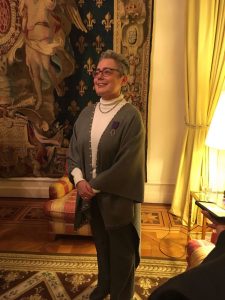Tribute to Dr. Sylvie Lannegrand ‘Chevalier dans l’Ordre des Palmes académiques’ by Prof. Jane Conroy

Sylvie Lannegrand has been a much valued colleague, and a wonderful friend to the student population, since she first appeared in the French Department in 1985, as a lectrice de français, and particularly since her full-time appointment in 1987. The prestigious award of the ‘Palmes académiques’ is an appropriate recognition of her exemplary work here and further afield.
The ‘Palmes académiques’ are awarded on the recommendation of the Minister for Education. They were created in 1804, by Napoleon, who may have had some flaws, but certainly possessed a shrewd understanding of leadership and the need to reward outstanding contributions. The purpose of the ‘palmes’ – or ‘la violette’, as the award is called because of the attractive colour of the decoration – is to recognize outstanding contributions to education and culture, in the same way as the Légion d’honneur, created 6 years earlier, was to reward civil and military achievement. Both of these new distinctions were devised to replace the old orders of chivalry, and to put the emphasis more on merit and less on genealogy.
In the case of Sylvie Lanegrand, there are many reasons why she has come to the attention of the French Government. Her high-level publications, for one thing: these include an acclaimed monograph which has refocussed attention on the author Yves Navarre and led to the publication of new editions of his work, for which she was invited to write the prefaces. Her profile as a researcher is remarkable for its originality and its coherence, and her present research on autobiographical works and how they are created, is closely linked to her study of Navarre’s diaries. The very many tangible outputs of her research have placed her as a leading specialist in the field. She has been associated with several acknowledged experts, such as Philippe Lejeune and Véronique Montémont. Her collaboration with the Centre national de la recherche scientifique (CNRS) and the École normale supérieure (ENS) has enriched the French Department’s research activity. In addition to this, Sylvie’s other high-profile activities include her energy and success as President of the Association des études francaises et francophones d’Irlande (ADEFFI), and her development of its profile, which has helped to make known aspects of French civilisation and literature in Ireland. Little wonder, then, that the French government has wanted to recognize her contribution in a very public way.
But there are the other things which are below the radar of any government, which take place within the University, and which it is up to the University to reward. These are the more routine aspects of academics’ work, their teaching and attention to those actions which make education a pleasure for students, and help the University to run more smoothly. Sylvie Lannegrand has excelled in these areas. She has undertaken more than her share of the administrative work of the University, and played an important role in some of the least visible but most essential areas, such as the Appeals Board or the Student Complaints Board, or Quality Reviews. Most of us, I imagine, would admit to having the occasional ‘off day’ when, shall we say, we (or at least I) would be less open to ideas, or the prospect of extra work, than on our better days. Sylvie doesn’t do ‘off days’. If there was one person who you could completely rely on to enter into a new plan, scrutinize it, judge it, and, if it was worth anything, support it, it was always Sylvie. And among those who would bring discussion around to what was best for the students, Sylvie was always to the fore. Given her dedication to the students, it is not completely surprising that she has won two Presidential Awards for Teaching, exceptional as that might be. Viewed from the ‘far side’, that is, from the relative tranquillity of retirement, Sylvie’s qualities emerge even more clearly, and her right to have these publicly recognized is even more obvious. It is with great pleasure that I – and her current colleagues thoughout French Studies in Ireland – welcome the French government’s perspicacity in awarding Sylvie the ‘Palmes académiques’.
Jane Conroy, November 2016

